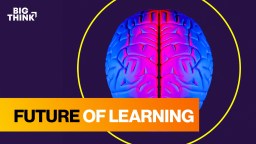The myth jeopardizing American education: Go to college to get a job

- The college experience has grown disorienting in recent years.
- Students are stressed out, while college administrators feel pressure to accommodate a legion of incompatible goals and interests.
- Psychologist Howard Gardner recommends that colleges recenter on a unifying mission: provide a liberal education that helps people think better.
What’s the purpose of college? It seems like a question with a simple answer: to educate young minds. But depending on the books you read, the experts you follow, or even the experiences you compare, you’ll discover widely dissimilar responses.
For some, college is an opportunity to explore a wealth of knowledge in a variety of disciplines. For others, it’s a place to hone job skills and build resumes. College is also proclaimed to be a cultivator of social responsibility, a political brainwashing institution, a 4-year-long mixer, or some mixture of all these.
For their new book, The Real World of College, Harvard psychologist Howard Gardner and Wendy Fischman, a project manager at the Harvard Graduate School of Education, set out to discover how people think about and experience college. I spoke with Gardner to learn what their research revealed, how colleges have lost their way, and what can be done about it.*
KEVIN: What led you to explore this big question, and how did you go about answering it?
GARDNER: We’re both social scientists. We work at Harvard’s Project Zero. We do research on education, and we realized that even though books about college come out every day, they’re the attitudes of the author rather than well-collected and analyzed data.
So we embarked on what turned out to be a 10-year enterprise. We interviewed 2,000 individuals at ten different campuses [nine non-vocational colleges and one engineering school]. At each campus, we spoke to 50 incoming students, 50 graduating students, and a smaller number of faculty, senior administrators, trustees, alums, and parents.
We had a large data set that took about five years to collect and about three years to analyze. Then we sat down and wrote a book in which we describe how it is and also put forward our aspirations of how it could be.
KEVIN: What did you find speaking with students directly about their experiences and perspectives on college?
GARDNER: The two things we were interested in before we began were: How do people think about college, and how do they think and reason in general?
We have lots to say about that, but what we weren’t expecting in 2012 was how huge the mental health issue was across campuses. Many students did not feel they belonged. Many of them felt alienated. We did not expect to have chapters on mental health and belonging, but those were two things we couldn’t ignore because they were such salient issues.
What about the pandemic? I think we can only say with confidence that mental health issues are as great now as they were before.

The building pressure to succeed
KEVIN: Your data revealed that every constituency cited mental health as the biggest concern on campus. What were the reasons for this?
GARDNER: What surprised me was how much of the mental health complaints were students feeling pressured, students feeling stressed, students feeling they had to achieve well in college or somehow they’d be doomed.
As somebody who’s been around for a long time, I can tell you that we ask less of students now than we did 25 or 30 years ago. We grade them much more generously. So I suspect that these issues begin much earlier than college — the pressures in secondary school to have a good resume, participate in lots of activities, and not do anything that will get you in trouble.
You’d have to be a real rebel to think that these pressures aren’t also causing mental health problems.
Another thing to say is that mental health is an issue that non-experts throw around loosely. And that would include me. Mental health experts would say there’s a difference between genuine depression, anxiety, or suicidal impulse.
We weren’t able to collect data on that, but when we asked about the biggest problems on campus, for every constituency mental health rose to the top. You can’t ignore that. That’s a very frightening finding. Schools have to take this into account.
KEVIN: A popular perception is that such pressure is only in highly selective schools. But this pressure extends across the board?
GARDNER: At a highly selective school, you’re more likely to feel “perfection syndrome.” You have to be absolutely perfect. You can’t get any A-’s. You can’t fail to get into any club. And so on.
Whereas at less selective schools, many people are working. Sometimes they’re working full-time. They may have a family. They may have parents they care for. We might say that’s a more indigenous kind of stress that you can’t wipe away.
Perfectibility, I think, would be much easier to reduce. For example, have fewer highly competitive entities on campus, have a first year where you’re not graded, and have a better onboarding experience.
Onboarding is our shorthand for the day you apply to college, the day you get accepted, the day you show up — whether you’re a day student or a border — college needs to explain to you what it’s about and what it’s not about.
You’d have to be a real rebel to think that these pressures aren’t also causing mental health problems.
A uniquely American problem
KEVIN: In my early college days, if you were to ask me what college was about, I would have drawn a complete blank.
GARDNER: This will undoubtedly rankle some people, but Fischman and I believe the major reason for college is to educate the mind.
If you go to a vocational school and they say, “We want to make you a dental hygienist,” I’m not going to argue with that. But if you go to a liberal arts school and it fails to educate your mind, to train you to think better, to acquire what we call “higher education capital,” then they’re wasting your money. They should go out of business.
This is an American problem because the true four-year non-vocational school doesn’t exist elsewhere. This is a gift we have in this country. It’s 2, 3, or 4 years where you don’t have to declare your vocation, but you can try different things out intellectually. You can try out different kinds of activities, as well.
By the time you need to make a decision — Do I want to go to law school? Do I want to go into business? — your mind is expanded. It’s acquired higher education capital. You’re in a much better position to decide what you want to do with the rest of your life. Not just work-wise, but citizenship, home-wise, as a community member, and so on.

Higher education capital
KEVIN: What is higher education capital, and why is it important?
GARDNER: Capital, of course, is an economic term. But higher education capital is intellectual capital. It means being able to think more deeply about things that matter.
How did we evaluate that? We started by asking, “Tell me a bit about yourself.” Then we had 40 questions like: What are you like in college? What are you doing here? If you could change things about college, what would you do? If you could give everybody a book, what book would it be?
You could say Moby Dick and get a low score, or you could say Goodnight Moon and get a high score. We didn’t care what book you chose. We cared: Did you analyze why you said it? Did you reflect on whether it was responsive to the question? Did you communicate clearly? We then scored these protocols blind by two coders who had to get what’s called agreement.
The good news is that overall, college seniors show more higher education capital than college freshmen. But there are two bits of not-so-good news.
One is that in some schools, the needle of higher education capital doesn’t move at all. That’s bad. It means if you talk to a senior or a freshman, you don’t hear the difference.
(I should make a technical point. These are cross-sectional studies, not longitudinal. So we’re not looking at the same kids, but we’re looking at 50 incoming students and 50 graduating students. And so we’re pretty confident that finding holds.)
Also — and this was quite eye-opening — alums’ higher education capital either stayed the same or was lower [5 to 10 years out of college]. That means, if I can be a little bit fresh, that you’re less stimulated once you leave college.
Most kids have never studied philosophy. They’ve never studied semiotics. They haven’t taken many music or art courses. They don’t know much about medieval society. They don’t know much about statistics or black holes. [College] is a chance to explore and transform.
KEVIN: When it comes to skills acquisition in college, people talk about teaching either hard skills — technical skills to use at a job — or soft skills — social and interpersonal skills.
It seems like you’re suggesting that higher education capital offers a foundation for acquiring both throughout one’s life. Am I hearing you correctly?
GARDNER: I wouldn’t use the word taught here. I wonder whether it’s modeled and encouraged. So, in classes, do we listen carefully? Do we step back and ask what’s meant? Do we discuss with one another how to analyze?
I just think that’s important, and I don’t care whether you call it hard or soft.
Now, if soft means “can you get along with your chums”? I think that’s important, but you don’t have to go to college for that. My Boy Scouts troop probably did more for that than going to college.
Technical skills. Sure, that’s important. If you take a statistics course, you shouldn’t pass if you don’t learn.
But we’re not interested in higher education teaching those skills. As far as I’m concerned, if you’re going to work for a company, it’s their job to make sure you’ve got those skills. And an internship will do it.
What we’re trying to give you in a higher education capital school are intellectual skills, which you can use whether you become a doctor, a lawyer, an art producer, or a sports manager. These abilities to attend, analyze, and so on. Call them hard or soft. Higher education capital will travel.

The spread of “shopping mall” colleges
KEVIN: This connects with a quote in your book: “Far more important, students should be asked to carry out work that is mind-expanding; projects and problem sets that stimulate them to take on new roles and try out unfamiliar ways of thinking.”
So you are envisioning higher education capital as more than, say, “Here’s a quiz. Can you crunch the numbers and get the correct answers?”
GARDNER: Yes, it’s more demanding on everybody. Now, I get to step on any toes I haven’t already.
America’s better-off colleges have huge sports stadiums (I’d like to make what some coaches make). They have lavish dining halls. Some have nine different restaurants and all kinds of stores. This is the shopping mall college, so to speak.
Let me use professional school as an analogy. We would laugh at a professional school where at the end of the day, students didn’t know how to do law or medicine or auditing. And we would laugh if they had 42 different sports because that’s not important if you’re going to be an auditor.
This is where modeling comes in. If we want students to have higher education capital, if we want them to explore, if we want them to be open to being transformed, then they need to see people around them — whether they’re administrators or faculty or alums — who embody that themselves.
KEVIN: The “shopping mall college” idea goes back to what you said earlier about this being a uniquely American phenomenon. What led American colleges to go down this route?
GARDNER: That’s a very good question, and I’m sure the answer is complicated.
In 1900, only 10% of American kids finished high school, and a much smaller percentage went to college. The great swell was after the Second World War, the so-called G.I. bill, which made it possible for veterans to go to college. That was unalloyedly a good thing.
Then from 1945 to 1970, the United States kind of ruled the world because we hadn’t been invaded or destroyed by the war, and we were doing well economically. So schools began to compete on how big was the football field, how many restaurants they had, what artworks did they buy, and things like that. And then it takes on a life of its own.
I bet you most college presidents don’t want to be competing over dormitory rooms. But we went on college tours, and courses are seldom mentioned. It’s how comfortable the dormitory room is. For Christ’s sake, you don’t have to go to college to have a nice room, but we lost track of why these institutions were founded in the first place, and we’re paying a very high price for that.

Mental models and the purpose of college
GARDNER: In addition to higher education capital, we have a chapter on what we call “mental models.” It’s our $24 phrase for why kids think they’re in college or why others think kids are there. There are four of them: inertial, transactional, exploratory, and transformational.
Inertial is, well, “I went to high school, and college is the next thing.” Fortunately, we don’t get much of that, but some people are inertial and they shouldn’t be in college.
The largest category, by far, is transactional. That’s the one we find problematic. It’s “I’m in college because I need to do that so I can get a job and be successful.” When we ask what happens when the job disappears, they’ve never even thought about that. That’s a trip that the media, including the college media, have played upon us.
The reason that Fischman and I think college exists in this country is so you can study topics that you haven’t studied before. Most kids have never studied philosophy. They’ve never studied semiotics. They haven’t taken many music or art courses. They don’t know much about medieval society. They don’t know much about statistics or black holes.
This is a chance to explore and transform. It’s “I’m one kind of a person in some aspects. I’m happy with who I am and how my parents raised me, but I’m open to becoming a different kind of person, a person who thinks differently and who has different goals.”
A mental misalignment
KEVIN: Why is the transactional mental model so dominant among students — especially if, as your research shows, the transformational model is so dominant among adults on campus and parents are evenly split?
GARDNER: Yes, the faculty and administrators are way out of step with everybody else. They believe college should be a place to explore and transform. No other constituencies — so freshman, seniors, parents, alums, job recruiters, trustees — none of them give a high priority to being transformational or exploratory.
Let me tell you an anecdote. I went to a college reunion recently, and I ended up having lunch with a classmate. We’ll call him John. He said to me, “I didn’t take advantage of Harvard. I just wanted to get through and make money.” And I said to myself, he’s clearly a transactional type.
Later I was talking to another person who was an expert on what was happening in Ukraine. The topic went that way, and John said, “You know, I took a course in my senior year comparing Russia and China in political science. I forget whether it was Professor Fairbank or Reishauer, but they helped me understand the role of long-term history.”
And I said, “You see, John! This course that you took 55 years ago opened you up so you could make sense of these kinds of things.”
We lost track of why these institutions were founded in the first place, and we’re paying a very high price for that.
Three collegiate challenges
KEVIN: In the book, you mentioned three problems that arise when colleges lose their focus: mission sprawl, projectitis, and misalignment. What are they, and what are your recommendations to ease them?
GARDNER: Mission sprawl is when schools have mission statements that promise everything in the world. We’re going to make you outstanding leaders, citizens, scientists, artists. We’re going to make you tougher, prouder, better looking. It’s crazy. No wonder many students don’t know why they’re in college.
Projectitis is whenever there’s a new need or somebody gives you money, you set up a new department, put somebody in charge of it, and name it after that person. And customers, the parents or the students, are just confused. Instead of having one place that works with, say, student problems, there are 45 different offices.
It should be streamlined. It should be clear what the major mission and major projects are. Projects should not live forever. When they’ve fulfilled their purpose, they should be sunsetted. All it does is confuse. This is something that anybody who reads business books would know is business 101. But it’s not part of the way schools operate.
We also looked at the extent to which different constituencies were misaligned. We talked about that earlier. What does it mean when faculty and administrators say that schools should be a transformative experience, but this is hardly ever mentioned by the other constituencies? You need to ask, Why is this the case? And is there something we can do about it?
I think any school can do something about [misalignment]. If the leaders of the school say, “We’re not going to try to be all things to all people anymore. Developing the capabilities to think well about new and challenging issues is what we want to be.” Any school that declared that would make a major victory before it got started because everything they did would be evaluated against that criteria.
But of course, what schools do now is the opposite. They just add a new mission, and they don’t care if there’s misalignment. They just bounce from one thing to the other.
I wouldn’t want any administrator to think that I don’t think these jobs are very difficult. They’re extraordinarily difficult in part because there are so many constituents, each pushing for something. But they also know that having a story to tell and embodying that story in your life is the most important thing you can do.
If you want to be a leader that just doesn’t balance the budget but leaves a mark, you have to know why you’re there, and you have to educate people to think with you about how to get there. I think that’s been completely lost in this shopping mall atmosphere.

Helping students find their way
KEVIN: When reading your book, my heart went out to this one student: Allison. She was inspired to explore, but she also believed that if she didn’t specialize early, she was setting herself up for failure.
In your view, what changes should be made to onboarding practices to help students like Allison?
GARDNER: You’re putting your finger on an important point that we discussed earlier. This is what’s called the “funnel effect.” Often students come in with an exploratory frame of mind, but they feel enormous pressure from peers, parents, and the media to specialize: to go on a straight track from an attractive internship to a well-paying job.
I think every school would have to recognize that reality, but it’s a reality that doesn’t have to be accepted. One can tell a different story, a mission-driven story. And it’s not just a question of onboarding. It’s a question of maintaining that message throughout.
This is often the case for these college-ranking places, where you think the only question is how much money are people making three-and-a-half years out. But do they lead satisfying lives? Do they do things that are meaningful to them? Do they get meaning out of their job?
The reality is that anybody motivated to take advantage of college in the way I’m talking about is never going to have to worry about being employed and being able to stay in your job because any employer is eager for people who can continue to learn, who can problem-solve, who can problem find.
And this is about our whole country, not just colleges. One of the sad things is our colleges and universities are one of the few things in this country that continue to be admired all over the world. I don’t even know what the other ones are. Certainly, it’s not our Congress. It’s not our Supreme Court. It’s not our Executive Branch, our military, or our journalism (anymore).
Wouldn’t it be sad if colleges and universities weren’t to right themselves and figure out what it is that they can uniquely do? And that’s to expand the mind.
If we want students to have higher education capital, if we want them to explore, if we want them to be open to being transformed, then they need to see people around them … who embody that themselves.
Find the through line
KEVIN: What’s the big idea you would like readers to take away? Whether I’m a parent or a student, what’s the most important message of this research?
GARDNER: That’s not an easy question. Having five grandchildren, if I said one thing, it’s to listen and read carefully what these schools say about themselves. If you have a chance to visit, or even to spend some time looking at the school newspaper or website, see what’s important and what manifests in how they behave.
If there’s too much there, write it off because it’s a story that promises everything and can’t possibly deliver. Look for a through line — something that makes sense to you — and see if in your encounters, whether in-person or online, that through line holds up.
And if you’re saying, “Look, I’m just interested in a vocation,” then answer the question: Why are you going to college? Why aren’t you just going to vocational school? If your answer is just because it’s the next thing or just to get a job, you shouldn’t be going to college at all.
KEVIN: Where can people find more information about the college experience?
GARDNER: You can look me up at howardgardner.com, or go to therealworldofcollege.com. MIT Press, our very good publisher, will be happy to sell you a copy of the book. Wendy Fischman is the first author, and she deserves all the credit that entails.
Learn more on Big Think+
With a diverse library of lessons from the world’s biggest thinkers, Big Think+ helps businesses get smarter faster. Learn more at https://develop.bigthink.com/plus/.
* This conversation has been edited for length and clarity.





